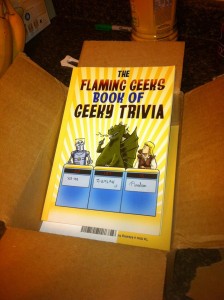I thought we should start off with some definitions and some explanations of what this site will be talking about. What is ebook publishing? Why would anyone want to do it? What’s the point of it? Why’s it worth my time to think about? And a thousand other questions you might have. So let’s get started tackling the big ones.
Traditional Publishing and Ebook Publishing
The traditional route to publication was and is for an author to write a book, then shop it around to agents and/or publishers, until one of them nibbles. You want an agent to handle your sales and contracts. You need the publisher to give you money, produce your book, and sell it.
This is a fine way to go. Once you’ve written your book, your agent and publisher are going to do a large share of the work. You’ll most likely get paid up front (an advance on royalties) and you won’t have to worry about the production and business side of the process more than you want to. Or not much more than you want to. The main drawback is all of this can take a lot of time. I’m talking years. Many years.

Well, maybe not this traditional.
The best thing is that this isn’t an either/or situation. You note I didn’t title this section ‘Traditional Publishing versus Ebook Publishing’. You can do both. You can have some of your books with a traditional publisher while you publish other books as ebooks. When your traditionally-published books go out of print, you can put them back in print yourself (if your contract allows it). When the ebook you published yourself is a hit, a traditional publisher may come knocking on your door. My opinion is that at this point in time, the ideal situation for an author is to be doing some of both. Your path to get there and to find the right balance is an individual one.
You Keep Saying “Ebook”
Yes, I do. It’s easier to start with an ebook. Easier, cheaper, faster. However, I do think you should make a print copy of your book as well, when you’re ready. It will help the ebook sell, actually, because it makes your book look more like a legitimate book, and will also make it look like a good deal compared to the price of your print book. But also it’s just very nice to have and hold in your hand. If you’re the sort of person who likes selling books in person, or signing them for readers.. well, you’re gonna want to have that print version!
Print formatting is fussier. You’ll need a spine and a back cover, not just a front. And you’ll need to order proof copies a couple of times until you get it right. It will take a little bit of time and a little bit of money. But it’s totally worth it.
So What Goes Into Making an Ebook?
Here’s the brief version: You write the book. You decide on all the ‘packaging’ — title, summary, categories, keywords. You design a spiffy cover. You format it the way the ebook platform wants you to. You upload it. Within about 24 hours, it’s a real published book, for sale. And now it’s up to you to help it sell.
And for your print book, it’s all of that, but with different formatting and a wrap-around cover.
Um… What Exactly Is an Ebook?
We’ll get more into formats in another post, but basically an ebook is an electronic or digital version of a book that can be read on a computer, on a phone, on a tablet, on an ereader, on your watch if you’re really cool, or pretty much on any electronic device.
People download them from many sources. Amazon is a big one, but also Smashwords, Overdrive, Apple iBooks, Barnes & Noble’s Nook Store, Project Gutenberg (free, out of copyright), company websites, private websites, maybe your own website.
While I may be talking a lot on this site about Amazon, do be aware that Amazon is one store, one platform, that Kindle is a brand name, and that the Kindle format is only one format. The ebook world is larger than Amazon, as much as Amazon would like it to be otherwise.

My ereader — Sony calls this “red”.
Do I Need to Own an Ereader?
No, but you should at least grab some ebooks to read on your computer or your phone, so you have some idea of what you’re trying to create! And I do like my ereader (Sony Reader Pocket Edition — yea, I’m reading it old school!). Plus, there is something extra cool about seeing your book on your ereader that viewing it on a computer screen just can’t capture.

